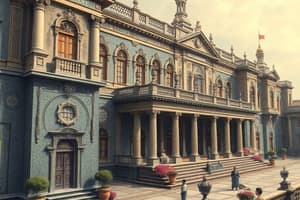Podcast
Questions and Answers
What is the meaning of the term 'anarchy'?
What is the meaning of the term 'anarchy'?
absence of any system of government in a society
What does 'aristocracy' mean?
What does 'aristocracy' mean?
people of the highest social class or nobility
What is the definition of 'democracy'?
What is the definition of 'democracy'?
form of government allowing every citizen to participate
What does 'despot' refer to?
What does 'despot' refer to?
Define 'oligarchy'.
Define 'oligarchy'.
What is the meaning of 'tyranny'?
What is the meaning of 'tyranny'?
What does the term 'tyrant' mean?
What does the term 'tyrant' mean?
Who was the leader that made all citizens over thirty eligible to serve on the council?
Who was the leader that made all citizens over thirty eligible to serve on the council?
The alliance of Greek city-states was called the _____
The alliance of Greek city-states was called the _____
The defining moment in Greek history is the ________ Wars.
The defining moment in Greek history is the ________ Wars.
Plato's famous teacher was _____.
Plato's famous teacher was _____.
Which Athenian reform leader established the Citizen's Assembly and forbade enslavement for debts?
Which Athenian reform leader established the Citizen's Assembly and forbade enslavement for debts?
What battle eliminated Persian influence in Greece and Athens?
What battle eliminated Persian influence in Greece and Athens?
Flashcards
Anarchy
Anarchy
The absence of a government or any governing system in a society.
Oligarchy
Oligarchy
A form of government where a small group of people holds all the power.
Democracy
Democracy
A system of government where citizens have the power to participate in decision-making.
Despot
Despot
Signup and view all the flashcards
Aristocracy
Aristocracy
Signup and view all the flashcards
Tyranny
Tyranny
Signup and view all the flashcards
Tyrant
Tyrant
Signup and view all the flashcards
Delian League
Delian League
Signup and view all the flashcards
Persian Wars
Persian Wars
Signup and view all the flashcards
Cleisthenes
Cleisthenes
Signup and view all the flashcards
Socrates
Socrates
Signup and view all the flashcards
Solon
Solon
Signup and view all the flashcards
Battle of Salamis Bay
Battle of Salamis Bay
Signup and view all the flashcards
Study Notes
Government Systems
- Anarchy: Represents a society without any governing authority or systems.
- Aristocracy: Comprised of individuals from the highest social elite or nobility, often holding significant influence.
- Democracy: A political system that enables all eligible citizens to partake in decision-making processes, emphasizing equality and participation.
- Despot: A ruler who wields absolute power, often characterized by an authoritarian regime.
- Oligarchy: A form of governance where power is held by a small, select group of individuals or families.
- Tyranny: A government marked by the cruel and unjust exercise of power, often led by a tyrant.
- Tyrant: An individual who exercises oppressive power, similar to a despot, often disregarding rights.
Key Figures and Events
- Cleisthenes: A reformer who expanded political participation by allowing citizens over thirty to serve on the council and increased the authority of the Citizen Assembly.
- Delian League: An alliance formed among Greek city-states to provide mutual defense against common enemies.
- Persian Wars: A critical series of conflicts that significantly shaped Greek history and reduced Persian dominance in the region.
- Socrates: Renowned philosopher and the mentor of Plato, known for his contributions to ethics and epistemology.
- Solon: An Athenian leader credited with major reforms, including establishing the Citizen's Assembly and abolishing debt slavery, while mandating that fathers ensure their sons acquired trades.
- Salamis Bay: A pivotal naval battle that decisively eliminated Persian influence over Greece and solidified Athenian power.
Studying That Suits You
Use AI to generate personalized quizzes and flashcards to suit your learning preferences.
Description
Explore various forms of government including democracy, anarchy, and tyranny, and learn about key historical figures like Cleisthenes who influenced political participation. This quiz will test your knowledge on governance structures and their characteristics.




